外研版(2019)选择性必修第四册 Unit3 The world meets China Using language-cultural exchange 名师课件(共31张PPT)
文档属性
| 名称 | 外研版(2019)选择性必修第四册 Unit3 The world meets China Using language-cultural exchange 名师课件(共31张PPT) | 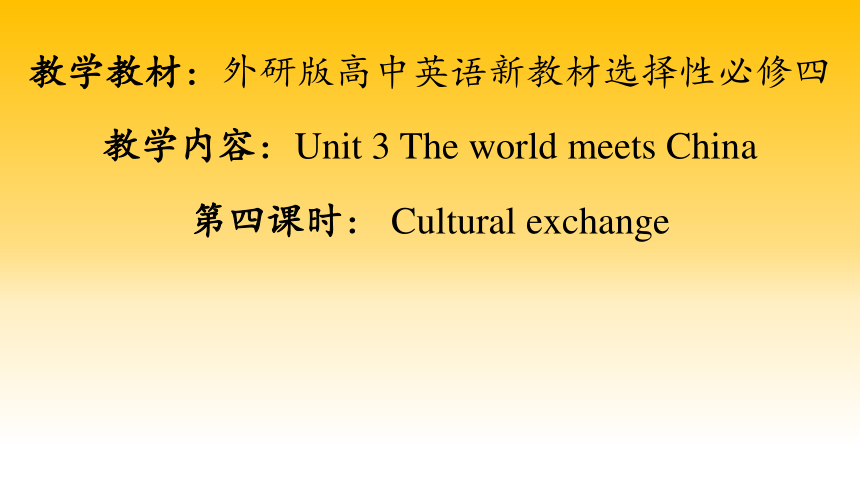 | |
| 格式 | pptx | ||
| 文件大小 | 135.9MB | ||
| 资源类型 | 教案 | ||
| 版本资源 | 外研版(2019) | ||
| 科目 | 英语 | ||
| 更新时间 | 2023-03-07 10:53:42 | ||
图片预览

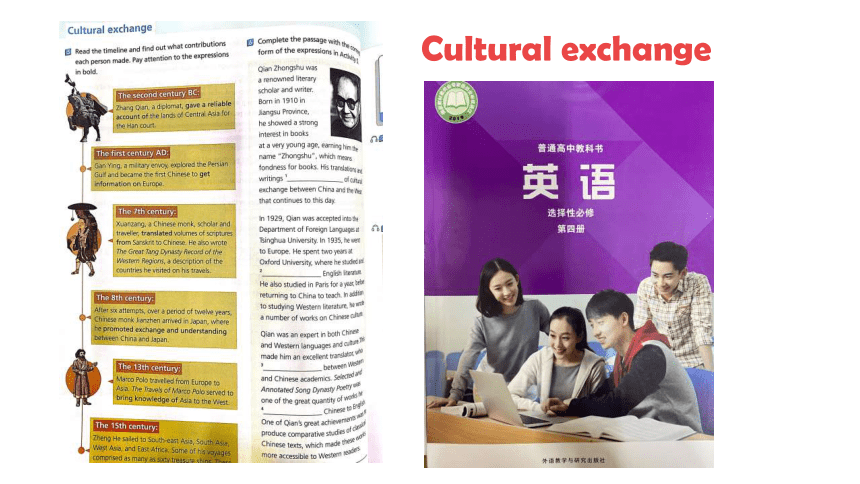
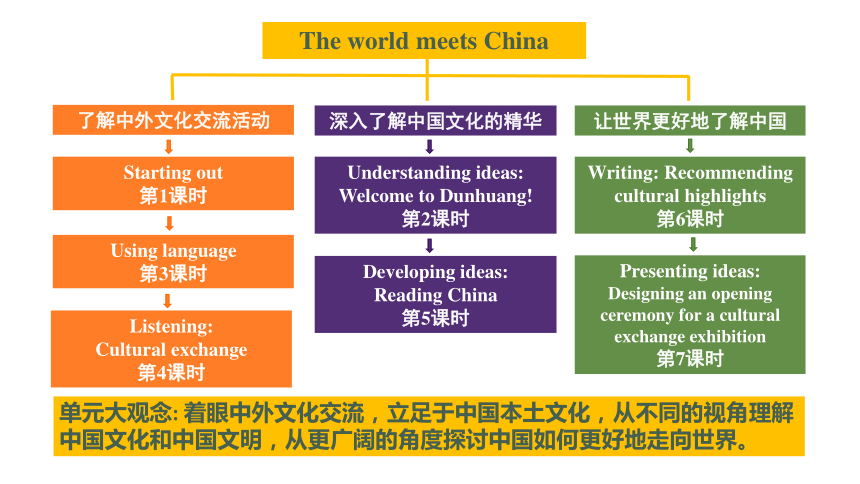

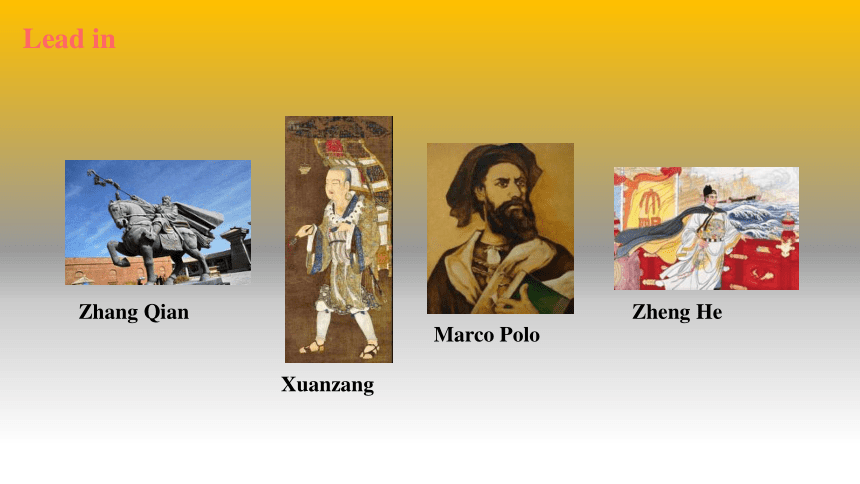
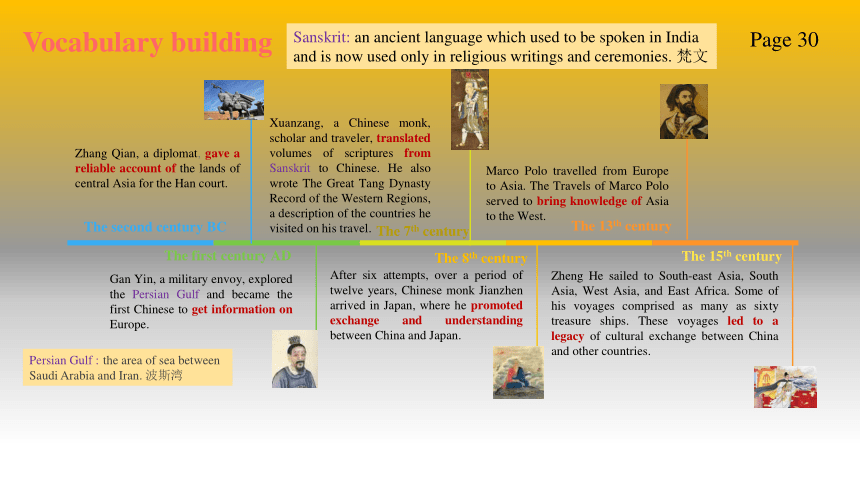

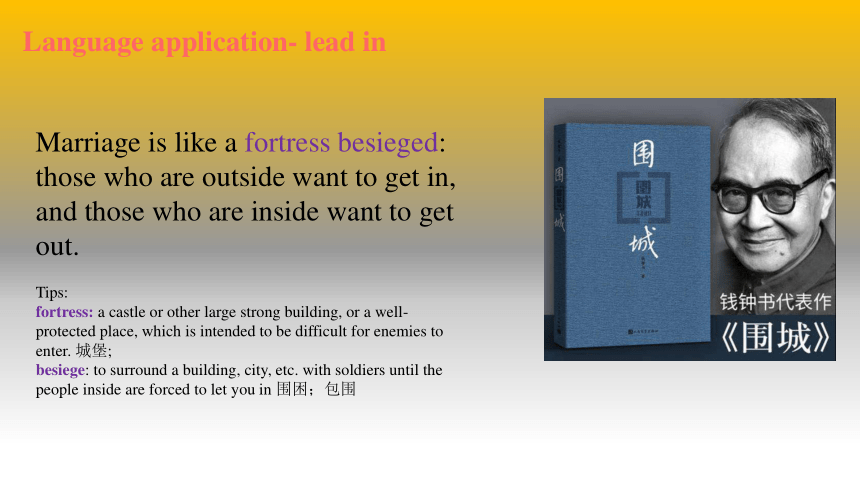
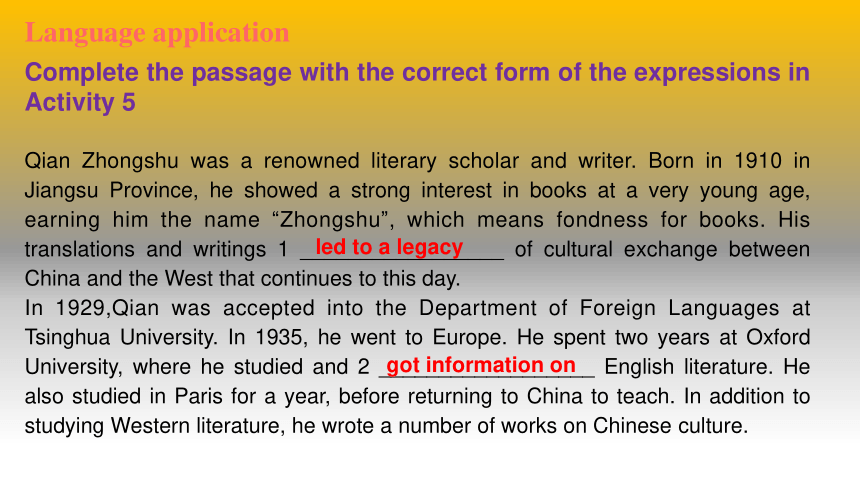
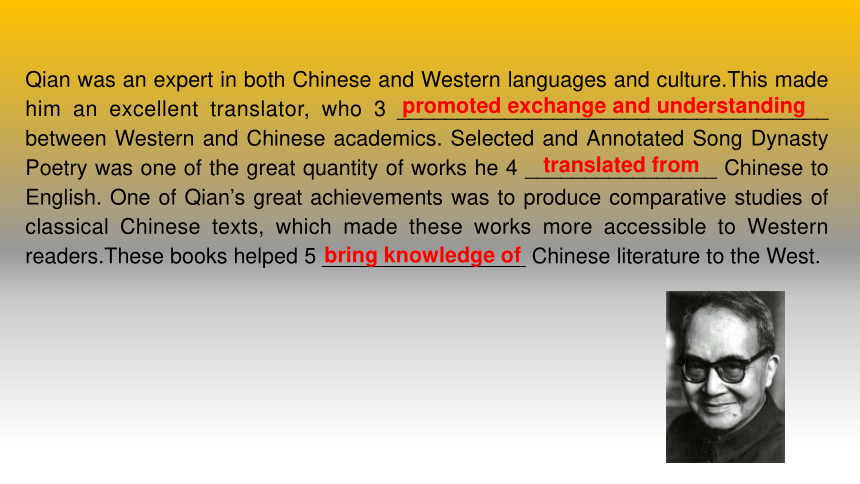
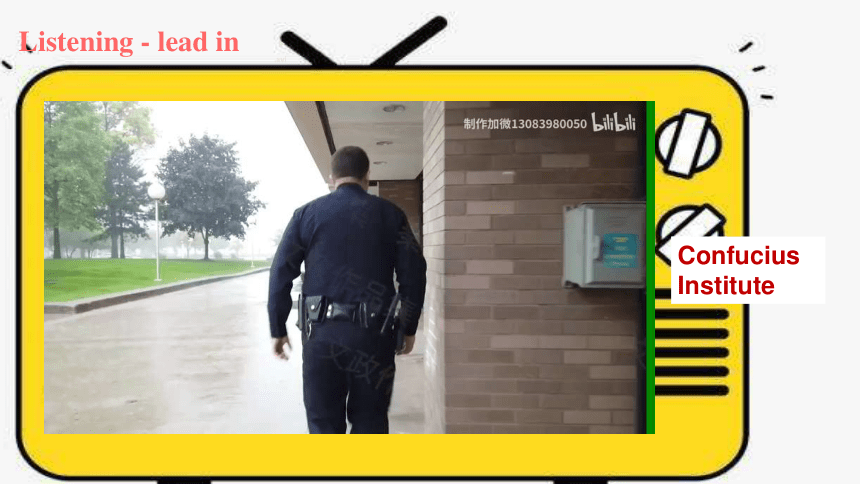
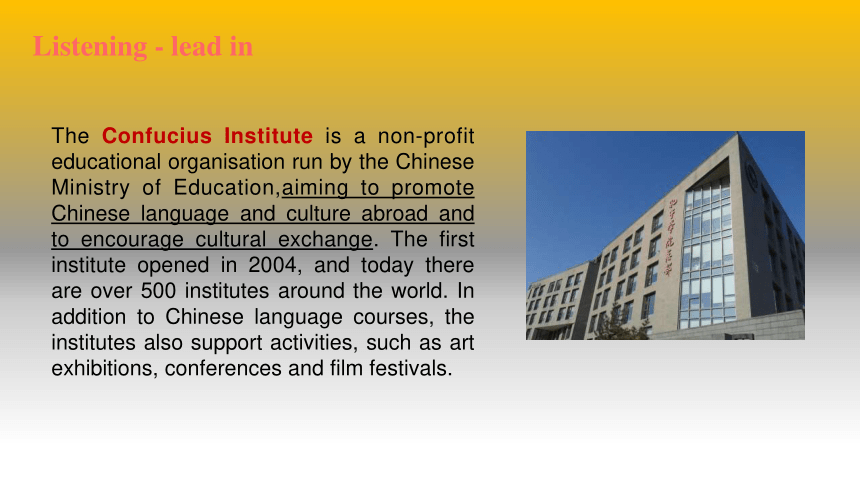
文档简介
(共31张PPT)
教学教材:外研版高中英语新教材选择性必修四
教学内容:Unit 3 The world meets China
第四课时: Cultural exchange
Cultural exchange
The world meets China
了解中外文化交流活动
深入了解中国文化的精华
让世界更好地了解中国
Starting out
第1课时
Using language
第3课时
Listening:
Cultural exchange
第4课时
Understanding ideas:
Welcome to Dunhuang!
第2课时
Developing ideas:
Reading China
第5课时
Writing: Recommending cultural highlights
第6课时
Presenting ideas: Designing an opening ceremony for a cultural exchange exhibition
第7课时
单元大观念: 着眼中外文化交流,立足于中国本土文化,从不同的视角理解中国文化和中国文明,从更广阔的角度探讨中国如何更好地走向世界。
History of cultural exchange between China and foreign countries;
Expressions related to cultural exchange, giving reasons and drawing conclusions;
In this class, you are going to learn:
Making use of the expressions to voice your own opinion.
Lead in
Zhang Qian
Xuanzang
Marco Polo
Zheng He
The second century BC
The first century AD
The 7th century
The 8th century
The 13th century
Zhang Qian, a diplomat, gave a reliable account of the lands of central Asia for the Han court.
Gan Yin, a military envoy, explored the Persian Gulf and became the first Chinese to get information on Europe.
The 15th century
Xuanzang, a Chinese monk, scholar and traveler, translated volumes of scriptures from Sanskrit to Chinese. He also wrote The Great Tang Dynasty Record of the Western Regions, a description of the countries he visited on his travel.
After six attempts, over a period of twelve years, Chinese monk Jianzhen arrived in Japan, where he promoted exchange and understanding between China and Japan.
Marco Polo travelled from Europe to Asia. The Travels of Marco Polo served to bring knowledge of Asia to the West.
Zheng He sailed to South-east Asia, South Asia, West Asia, and East Africa. Some of his voyages comprised as many as sixty treasure ships. These voyages led to a legacy of cultural exchange between China and other countries.
Vocabulary building
Page 30
Persian Gulf : the area of sea between Saudi Arabia and Iran. 波斯湾
Sanskrit: an ancient language which used to be spoken in India and is now used only in religious writings and ceremonies. 梵文
1.give a reliable account of
2.get information on
3.translate ……from……
4.promote exchange and understanding
5.lead to a legacy
Vocabulary building
给出可靠的描述
获得信息
把······从······翻译成······
推进交流和理解
留下遗产
Marriage is like a fortress besieged: those who are outside want to get in, and those who are inside want to get out.
Language application- lead in
Tips:
fortress: a castle or other large strong building, or a well-protected place, which is intended to be difficult for enemies to enter. 城堡;
besiege: to surround a building, city, etc. with soldiers until the people inside are forced to let you in 围困;包围
Complete the passage with the correct form of the expressions in Activity 5
Qian Zhongshu was a renowned literary scholar and writer. Born in 1910 in Jiangsu Province, he showed a strong interest in books at a very young age, earning him the name “Zhongshu”, which means fondness for books. His translations and writings 1 _________________ of cultural exchange between China and the West that continues to this day.
In 1929,Qian was accepted into the Department of Foreign Languages at Tsinghua University. In 1935, he went to Europe. He spent two years at Oxford University, where he studied and 2 __________________ English literature. He also studied in Paris for a year, before returning to China to teach. In addition to studying Western literature, he wrote a number of works on Chinese culture.
led to a legacy
got information on
Language application
Qian was an expert in both Chinese and Western languages and culture.This made him an excellent translator, who 3 ____________________________________ between Western and Chinese academics. Selected and Annotated Song Dynasty Poetry was one of the great quantity of works he 4 ________________ Chinese to English. One of Qian’s great achievements was to produce comparative studies of classical Chinese texts, which made these works more accessible to Western readers.These books helped 5 _________________ Chinese literature to the West.
promoted exchange and understanding
translated from
bring knowledge of
Listening - lead in
Confucius Institute
The Confucius Institute is a non-profit educational organisation run by the Chinese Ministry of Education,aiming to promote Chinese language and culture abroad and to encourage cultural exchange. The first institute opened in 2004, and today there are over 500 institutes around the world. In addition to Chinese language courses, the institutes also support activities, such as art exhibitions, conferences and film festivals.
Listening - lead in
Listen to the conversation and choose the topics covered.
1. The reason why Liang Ran decided to work for the Confucius Institute.
2. The working environment at the Institute.
3. The troubles he had during teaching.
4. A special moment from his time at the Institute.
5. What he learnt from his students.
6. The friends he made in New York.
Listening
Listen again and complete the passage.
Liang Ran spent 1_____________abroad working as a teacher at 2 _______________________________. He said it was a difficult decision, because it would mean 3 __________________. Finally, he decided to go as he wanted to help foreigners learn Chinese and learn about China. He also wanted to 4 _____________________________________________.
Listening
Listen again and complete the passage.
Liang Ran spent 1_____________abroad working as a teacher at 2 _______________________________.He said it was a difficult decision, because it would mean 3 __________________. Finally, he decided to go as he wanted to help foreigners learn Chinese and learn about China. He also wanted to 4 _____________________________________________.
Listening
Listen again and complete the passage.
Liang Ran spent 1_____________abroad working as a teacher at 2 _______________________________.He said it was a difficult decision, because it would mean 3 __________________. Finally, he decided to go as he wanted to help foreigners learn Chinese and learn about China. He also wanted to 4 _____________________________________________.
a whole year
the Confucius Institute in New York
delaying his studies
experience life abroad and learn about Western culture
Listening
At first, Liang was surprised at 5 ______________________________ as they were quite varied. They were all interested in Chinese culture, however. One challenge they met was that they 6 ____________________________
___________ so Liang had to give them a lot of support.
the different ages of the students
had some difficulty with Chinese
characters
Liang's most memorable experience was at the end of the year when students learnt about traditional Chinese dancing and 7 _________________. Liang said their 8 ___________ was amazing.
Chinese costumes
enthusiasm
Working there made Liang a better person. Through teaching Chinese, he 9
______________________________ and through interacting with students, he 10 _________________________.
became even more proud of China
learnt more about the world
Friend: Liang Ran, I'm so glad to see you again! Has it really been a whole year
Welcome back!
Liang Ran: Thanks! It's so good to be back in China.
Friend: So you spent a whole year at the Confucius Institute in New York working as a Chinese language teacher, right
Liang Ran: I did, yes.
Friend: But that meant you had to put university on hold for a year. Wasn't that a tough decision Weren't you worried about delaying your studies
Liang Ran: It was a difficult decision to make. But the reason why I went is that I think helping people learn Chinese is a good thing. Also, I wanted to experience life abroad and learn about Western culture. The job at the Confucius Institute was the perfect opportunity.
Friend: What was your work like
Liang Ran: I was a bit surprised at first. That was due to the different ages of the students. Some were teenagers, some were young adults, and some were in their forties and fifties. The thought of teaching people much older than me made me really nervous.
Friend: I would have been nervous, too. Did everything work out OK
Liang Ran: Yes, I shouldn't have been at all worried. My students were all really interested in Chinese culture and happy to learn from me. They did have some difficulty with Chinese characters, and I had to give them lots of support there. On the whole, it was a wonderful experience.
Friend: Do you have any special memories
Liang Ran: Hmm...Yes! Right at the end of the year, there was a show of traditional
Chinese dancing at the institute. The very next day, I came into class to find my
students practising the dances...
Friend: They were learning Chinese dancing !
Liang Ran: Yes! [laughing] They ended up organizing their own dance show. It was
impressive seeing them dance in Chinese costumes. Their enthusiasm was amazing.
Friend: Do you think you've changed in any way
Liang Ran: To sum up, the whole experience made me a better person. Through teaching them Chinese, I realised that there are people all over the world who are fascinated by Chinese culture, which made me become even more proud of China. And through interacting with my students, I learnt more about the world, which will help me in my studies and career. In short, I learnt a lot this year.
Complete the boxes with the expressions from the conversation.
The reason why... is that...
That was due to...
On the whole,...
To sum up,...
In short,...
Drawing conclusions
Giving reasons
Drawing conclusions
Complete the boxes with the expressions from the conversation.
Drawing conclusions
The reason why... is that...
That was due to...
On the whole,...
To sum up,...
In short,...
Giving reasons
Drawing conclusions
1. I’d attribute a lot of success of mine to the unselfish sacrifice from my family.
2. To my mind, train travel is more enjoyable than taking any other means of transport. A reason for this is when the train moves, we can enjoy the beautiful sceneries outside the train window.
3. In my view, life in a small place is more comfortable than life in a large city. I’d put it down to the fact that the life pace in a small city is much slower than that of a big city.
4. Now, I can always come up with many convincing ideas for my writing. It’s all thanks to my reading habit which has been developed since I was pretty young.
More expressions
1. In a word, I can’t go out as have many things to do.
2. Generally speaking, the coldest weather comes in January.
3. To conclude, we must make a final decision right now.
4. We both thought that all in all it might not be a bad idea.
5. In closing, class of 2002, we would like to leave you with some words of wisdom.
More expressions
Complete the boxes with the expressions from the conversation.
Drawing conclusions
The reason why... is that...
That was due to...
I’d attribute …to …
It’s all thanks to…
A reason for this is …
I’d put it down to the fact that
On the whole,...
To sum up,...
In short,...
In a word…
Generally speaking…
To conclude…
All in all …
In closing…
Giving reasons
Drawing conclusions
Beijing Olympic Games
Expo 2010 Shanghai China
Olympic Winter Games Beijing 2022
Enjoy it
Assignment
Think of a way about what you can do to spread Chinese culture and share it with your family using the expressions in this section.
Reflection Period 1 Period 2 Period 3 Period 4 Period 5 Period 6
1. What is your understanding of the relationship and communication between China and the rest of the world
2. What text types have you learnt about What are their features
3. What words, expressions and structures have you learnt
4. What improvement have you made in understanding different cultures
5. What improvement have you made in using learning strategies and exploring effective ways of learning
6. What improvement have you made in analyzing and solving problems
7. One thing I need to improve next time.
T
H
A
N
K
S
!
教学教材:外研版高中英语新教材选择性必修四
教学内容:Unit 3 The world meets China
第四课时: Cultural exchange
Cultural exchange
The world meets China
了解中外文化交流活动
深入了解中国文化的精华
让世界更好地了解中国
Starting out
第1课时
Using language
第3课时
Listening:
Cultural exchange
第4课时
Understanding ideas:
Welcome to Dunhuang!
第2课时
Developing ideas:
Reading China
第5课时
Writing: Recommending cultural highlights
第6课时
Presenting ideas: Designing an opening ceremony for a cultural exchange exhibition
第7课时
单元大观念: 着眼中外文化交流,立足于中国本土文化,从不同的视角理解中国文化和中国文明,从更广阔的角度探讨中国如何更好地走向世界。
History of cultural exchange between China and foreign countries;
Expressions related to cultural exchange, giving reasons and drawing conclusions;
In this class, you are going to learn:
Making use of the expressions to voice your own opinion.
Lead in
Zhang Qian
Xuanzang
Marco Polo
Zheng He
The second century BC
The first century AD
The 7th century
The 8th century
The 13th century
Zhang Qian, a diplomat, gave a reliable account of the lands of central Asia for the Han court.
Gan Yin, a military envoy, explored the Persian Gulf and became the first Chinese to get information on Europe.
The 15th century
Xuanzang, a Chinese monk, scholar and traveler, translated volumes of scriptures from Sanskrit to Chinese. He also wrote The Great Tang Dynasty Record of the Western Regions, a description of the countries he visited on his travel.
After six attempts, over a period of twelve years, Chinese monk Jianzhen arrived in Japan, where he promoted exchange and understanding between China and Japan.
Marco Polo travelled from Europe to Asia. The Travels of Marco Polo served to bring knowledge of Asia to the West.
Zheng He sailed to South-east Asia, South Asia, West Asia, and East Africa. Some of his voyages comprised as many as sixty treasure ships. These voyages led to a legacy of cultural exchange between China and other countries.
Vocabulary building
Page 30
Persian Gulf : the area of sea between Saudi Arabia and Iran. 波斯湾
Sanskrit: an ancient language which used to be spoken in India and is now used only in religious writings and ceremonies. 梵文
1.give a reliable account of
2.get information on
3.translate ……from……
4.promote exchange and understanding
5.lead to a legacy
Vocabulary building
给出可靠的描述
获得信息
把······从······翻译成······
推进交流和理解
留下遗产
Marriage is like a fortress besieged: those who are outside want to get in, and those who are inside want to get out.
Language application- lead in
Tips:
fortress: a castle or other large strong building, or a well-protected place, which is intended to be difficult for enemies to enter. 城堡;
besiege: to surround a building, city, etc. with soldiers until the people inside are forced to let you in 围困;包围
Complete the passage with the correct form of the expressions in Activity 5
Qian Zhongshu was a renowned literary scholar and writer. Born in 1910 in Jiangsu Province, he showed a strong interest in books at a very young age, earning him the name “Zhongshu”, which means fondness for books. His translations and writings 1 _________________ of cultural exchange between China and the West that continues to this day.
In 1929,Qian was accepted into the Department of Foreign Languages at Tsinghua University. In 1935, he went to Europe. He spent two years at Oxford University, where he studied and 2 __________________ English literature. He also studied in Paris for a year, before returning to China to teach. In addition to studying Western literature, he wrote a number of works on Chinese culture.
led to a legacy
got information on
Language application
Qian was an expert in both Chinese and Western languages and culture.This made him an excellent translator, who 3 ____________________________________ between Western and Chinese academics. Selected and Annotated Song Dynasty Poetry was one of the great quantity of works he 4 ________________ Chinese to English. One of Qian’s great achievements was to produce comparative studies of classical Chinese texts, which made these works more accessible to Western readers.These books helped 5 _________________ Chinese literature to the West.
promoted exchange and understanding
translated from
bring knowledge of
Listening - lead in
Confucius Institute
The Confucius Institute is a non-profit educational organisation run by the Chinese Ministry of Education,aiming to promote Chinese language and culture abroad and to encourage cultural exchange. The first institute opened in 2004, and today there are over 500 institutes around the world. In addition to Chinese language courses, the institutes also support activities, such as art exhibitions, conferences and film festivals.
Listening - lead in
Listen to the conversation and choose the topics covered.
1. The reason why Liang Ran decided to work for the Confucius Institute.
2. The working environment at the Institute.
3. The troubles he had during teaching.
4. A special moment from his time at the Institute.
5. What he learnt from his students.
6. The friends he made in New York.
Listening
Listen again and complete the passage.
Liang Ran spent 1_____________abroad working as a teacher at 2 _______________________________. He said it was a difficult decision, because it would mean 3 __________________. Finally, he decided to go as he wanted to help foreigners learn Chinese and learn about China. He also wanted to 4 _____________________________________________.
Listening
Listen again and complete the passage.
Liang Ran spent 1_____________abroad working as a teacher at 2 _______________________________.He said it was a difficult decision, because it would mean 3 __________________. Finally, he decided to go as he wanted to help foreigners learn Chinese and learn about China. He also wanted to 4 _____________________________________________.
Listening
Listen again and complete the passage.
Liang Ran spent 1_____________abroad working as a teacher at 2 _______________________________.He said it was a difficult decision, because it would mean 3 __________________. Finally, he decided to go as he wanted to help foreigners learn Chinese and learn about China. He also wanted to 4 _____________________________________________.
a whole year
the Confucius Institute in New York
delaying his studies
experience life abroad and learn about Western culture
Listening
At first, Liang was surprised at 5 ______________________________ as they were quite varied. They were all interested in Chinese culture, however. One challenge they met was that they 6 ____________________________
___________ so Liang had to give them a lot of support.
the different ages of the students
had some difficulty with Chinese
characters
Liang's most memorable experience was at the end of the year when students learnt about traditional Chinese dancing and 7 _________________. Liang said their 8 ___________ was amazing.
Chinese costumes
enthusiasm
Working there made Liang a better person. Through teaching Chinese, he 9
______________________________ and through interacting with students, he 10 _________________________.
became even more proud of China
learnt more about the world
Friend: Liang Ran, I'm so glad to see you again! Has it really been a whole year
Welcome back!
Liang Ran: Thanks! It's so good to be back in China.
Friend: So you spent a whole year at the Confucius Institute in New York working as a Chinese language teacher, right
Liang Ran: I did, yes.
Friend: But that meant you had to put university on hold for a year. Wasn't that a tough decision Weren't you worried about delaying your studies
Liang Ran: It was a difficult decision to make. But the reason why I went is that I think helping people learn Chinese is a good thing. Also, I wanted to experience life abroad and learn about Western culture. The job at the Confucius Institute was the perfect opportunity.
Friend: What was your work like
Liang Ran: I was a bit surprised at first. That was due to the different ages of the students. Some were teenagers, some were young adults, and some were in their forties and fifties. The thought of teaching people much older than me made me really nervous.
Friend: I would have been nervous, too. Did everything work out OK
Liang Ran: Yes, I shouldn't have been at all worried. My students were all really interested in Chinese culture and happy to learn from me. They did have some difficulty with Chinese characters, and I had to give them lots of support there. On the whole, it was a wonderful experience.
Friend: Do you have any special memories
Liang Ran: Hmm...Yes! Right at the end of the year, there was a show of traditional
Chinese dancing at the institute. The very next day, I came into class to find my
students practising the dances...
Friend: They were learning Chinese dancing !
Liang Ran: Yes! [laughing] They ended up organizing their own dance show. It was
impressive seeing them dance in Chinese costumes. Their enthusiasm was amazing.
Friend: Do you think you've changed in any way
Liang Ran: To sum up, the whole experience made me a better person. Through teaching them Chinese, I realised that there are people all over the world who are fascinated by Chinese culture, which made me become even more proud of China. And through interacting with my students, I learnt more about the world, which will help me in my studies and career. In short, I learnt a lot this year.
Complete the boxes with the expressions from the conversation.
The reason why... is that...
That was due to...
On the whole,...
To sum up,...
In short,...
Drawing conclusions
Giving reasons
Drawing conclusions
Complete the boxes with the expressions from the conversation.
Drawing conclusions
The reason why... is that...
That was due to...
On the whole,...
To sum up,...
In short,...
Giving reasons
Drawing conclusions
1. I’d attribute a lot of success of mine to the unselfish sacrifice from my family.
2. To my mind, train travel is more enjoyable than taking any other means of transport. A reason for this is when the train moves, we can enjoy the beautiful sceneries outside the train window.
3. In my view, life in a small place is more comfortable than life in a large city. I’d put it down to the fact that the life pace in a small city is much slower than that of a big city.
4. Now, I can always come up with many convincing ideas for my writing. It’s all thanks to my reading habit which has been developed since I was pretty young.
More expressions
1. In a word, I can’t go out as have many things to do.
2. Generally speaking, the coldest weather comes in January.
3. To conclude, we must make a final decision right now.
4. We both thought that all in all it might not be a bad idea.
5. In closing, class of 2002, we would like to leave you with some words of wisdom.
More expressions
Complete the boxes with the expressions from the conversation.
Drawing conclusions
The reason why... is that...
That was due to...
I’d attribute …to …
It’s all thanks to…
A reason for this is …
I’d put it down to the fact that
On the whole,...
To sum up,...
In short,...
In a word…
Generally speaking…
To conclude…
All in all …
In closing…
Giving reasons
Drawing conclusions
Beijing Olympic Games
Expo 2010 Shanghai China
Olympic Winter Games Beijing 2022
Enjoy it
Assignment
Think of a way about what you can do to spread Chinese culture and share it with your family using the expressions in this section.
Reflection Period 1 Period 2 Period 3 Period 4 Period 5 Period 6
1. What is your understanding of the relationship and communication between China and the rest of the world
2. What text types have you learnt about What are their features
3. What words, expressions and structures have you learnt
4. What improvement have you made in understanding different cultures
5. What improvement have you made in using learning strategies and exploring effective ways of learning
6. What improvement have you made in analyzing and solving problems
7. One thing I need to improve next time.
T
H
A
N
K
S
!
